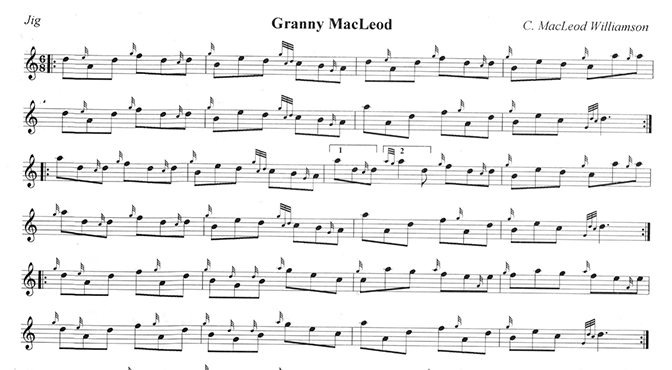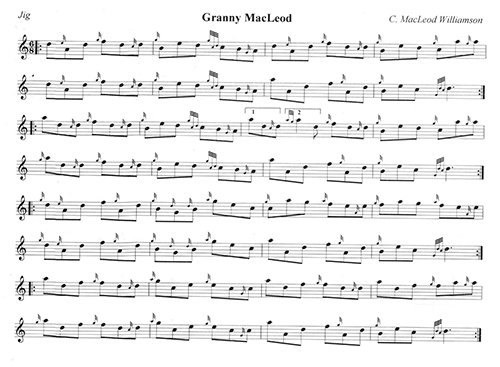
The following has been received from Steve Connor in Toronto in response to a recent letter regarding the composer Charles MacLeod Williamson. It gives a fascinating insight into the composer’s character and musical inspiration……

By Steve Connor, Toronto
I am responding to your enquiry about Charles MacLeod Williamson. I live in Canada now but knew Charlie probably better than anyone in the piping scene in the 1980s and into the 90s in Edinburgh, Scotland. He was a family friend and my father grew up with him from the 1950s onwards.
I was one of his very few pupils. He worked for Edinburgh Corporation Transport for many years at Longstone. He used to clean the buses at the terminal. His broom handle was where many of his tunes were given their first trial. Some would not even be played on the chanter first. They would make their way from his mind to the handle, to the manuscript fully formed. My father thought he was a genius, as do I.
Charlie MacLeod Williamson, in my opinion, was way ahead of his time. Had he been born in another era his work would have been better appreciated. As I say, I got to know him because of my father, Danny Connor. At a young age (14 ), he played with the Edinburgh Special Constabulary Pipe Band of which Charlie was a member along with his brother Tommy Williamson who was, I think, the Pipe Major. I have many stories related to me by my father of Charlie tuning up before competitions. Some listening would mock his syncopated rhythms and compositions, whilst others would be brought to tears with sheer joy at his playing ability. Donald MacLeod [P/M MacLeod, the legendary piper, teacher and composer] was one such person who held Charlie in the highest regard.
My father taught me from the age of eight. When I was twelve he asked his friend Charlie if he would take me for some lessons. Charlie reluctantly agreed (he was very introverted ). I cycled from my home in East Craigs, Edinburgh, to Clermiston once a week, rain, hail or shine for what can only be described as a complete master class in music composition, technique and oral history of a time gone by. He would describe where he was and what thoughts he had behind every tune he composed.
[wds id=”2″]
Everything came from his heart. When he played he was lost in another world; you could not describe it. It had to be felt and witnessed. For example, he wrote a full orchestral suite about the Aberfan mining disaster, the pipes being the main instrument. A brilliant piece of work, it brought out deep emotions in Charlie and that was echoed in his music. He wrote the score for all instruments, not just the pipes.
My lessons would begin with a chat with Charlie about politics, the labour movement, cake and tea with his wife and we would then get down to practice, Charlie was not only an amazingly talented piper, he was also a quite brilliant clarinet player. His son inherited those genes as he went on to teach music and play in top orchestras but never took up the pipes. I think that was probably the main reason why Charlie agreed to take me as his pupil. He handed down his life’s work in piping to me through our lessons. It’s also worth noting that his wife was a gifted pianist.
He is best known for his jigs and 6/8 marches as they were the ones that were chosen by others to be published, and to be quite honest, were the only ones that most would be able to play because of the intricate finger work required for many of his other tunes. A couple of his compositions appear in collections – 6/8 marches Farewell To The Tartan and Tommy Williamson – but what must be pointed out is that those printed tunes are not actually the way Charlie composed them. Gracenotes were left out, and phrasing was reinterpreted by the authors.

Charlie was not pleased that someone would take his tunes as written and then change them before going to print without his knowledge. What might be seen by some as a minute detail like an E gracenote being changed to a G gracenote was of huge significance to him. Granny MacLeod for instance has many gracenotes omitted from the printed version of the tune. There are also double dotted rests in the 3rd and 4th parts that were not printed, but when played as written by Charlie give the tune a completely different phrasing and feel. He wrote this when he was about fourteen in his grandmother’s bedroom after she brought him tea and toast. The tune came to him in a few minutes and he wrote it down there and then.
Listen to Granny Macleod played by the Whistlebinkies traditional group recorded in 1981:
Tunes he wrote are all in a handwritten green music book which used to come out at every lesson for me to choose which amazingly complex tune I wanted to attempt to play. I always had to write down the tunes in my own book – this being part of the lesson – so that I would understand why he had written a double dot or tied notes together. He emphasised to me the way it should be played and told me not to reinterpret just because that would make the tune easier to play. Some of my favourites are hornpipes and 12/8 jigs that no one has ever heard the likes of. I often wondered what would have happened if Gordon Duncan and Charlie had grown up together; their minds were on the same plane but eras apart.
In later years I joined the Scottish Gas Pipe Band under Gordon Campbell and we managed to talk Charlie into coming along to the practices and he joined the band. His enthusiasm was revitalized. He was, I think, pleased that so many in the band were interested in his music and wanted to know its history. A couple of those tunes were recorded on their album. It is heartwarming for me to know that there is interest in Charlie and his music to this day. I thank Stevie McDonaugh, who now lives in France, a former member of the ‘Gas’ band and friend of Charlie’s, for pointing this article out to me. Best regards from Toronto, Stevie Connor.
• If anyone has any pictures of Charles MacLeod Williamson please forward to the usual address. We would also be interested to learn of his orchestral suite for pipes ‘Aberfan’ as mentioned above. Does anyone in the Scottish Gas band know the names of the CMW tunes they recorded?
[wds id=”28″]















Many thanks for the treasure trove of information on the late Charlie Williamson. I was delighted to read so much about what kind of person he was in addition to your article echoing many of the tales I’d heard over the years about his exceptional abilities as a composer and a player. One of his jigs was called Jimmy Yardley and it was from Jimmy that I first heard “Charlie Williamson’s Nameless Jig” and was HOOKED! Your description of the need for interpretation from written to playing was very well expressed and absolutely true. Any other follow-up (pictures etc) you might have would be appreciated. Please note that I have your CD “Footprints”. Ken Moorhouse.
Very nice to hear that you are playing Charlie’s tunes Keen, and thank you for listening to my music. Charlie had written a number of nameless tunes, Hornpipes, jigs, 12/8 marches. Writing my reply gave me the chance to remember how lucky I was to have been under his tutelage, I was also able to sit and chat with him over a pint or two, when I was old enough to drink and socialize, the stories of his piping days of old and the people he mixed with were a wonder to me, a fascinating man. Kindly. Stevie Connor.